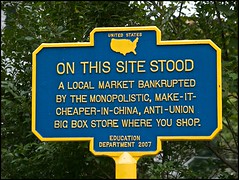
"Mind-boggling," an old friend of ours would say when confronted with a complex problem, "mind-boggling."
Those words come to mind when viewing the current health care debate, and the amount of information--and disinformation--swirling about. Town meetings are disrupted by middle-aged protestors, the right screaming "socialism", and rumors abounding of government-appointed "death panels" handing down edicts concerning your loved one's worthiness to live or to die.
We don't presume to be able to offer a solution to the problem here, but we do offer some more pieces of anecdotal evidence which should figure into a thinking citizen's reasoning.
Yesterday the phone rang. The voice at the other end was vaguely familiar yet strange and rasping. It was the guy who used to say "Mind-boggling." It had been months since we had heard from him, and we were starting to wonder if anything had happened to him. He spoke so softly it was hard to hear him over the phone, but here's basically what he said.
(He's 66 years old, so he has Medicare, but most probably no supplemental insurance.) Some time ago he wasn't feeling well, so he had his wife take him to the emergency room. (That's right, no primary care physician, right to the hospital, as the poor tend to do.) He has a fever, and is given an "injection", after which he passes out and is admitted. During the course of his hospitalization, he is placed on a respirator. ("There were tubes coming out from all over me.") At some point, he says, they wanted to "pull the plug." By this time his sister was there. She is a bit of a "bammer," and talked the doctors into performing more tests. (Meanwhile, a priest is summoned and gives the last rites.) Eventually, he said, he was diagnosed with Lyme Disease. He's now home, but in weakened condition.
In the meantime an emotion-tinged debate about national health care rages on. The latest headlines speak of "death panels" as a provision of the pending legislation, conjuring up visions of the movie
Soylent Green, with
Edward G. Robinson going to his assisted suicide
finale to the strains of Beethoven's Sixth.
It appears now that any wording that can be construed as establishing "death panels" has been taken out of the legislation.
But one fact remains: unless you yourself have a strong advocate present during your hospitalization,
there is absolutely no guarantee that you'll make it through unscathed or even alive.
We no longer have personal physicians (for the most part). If you are unable to speak for yourself, there's no telling which way your treatment may go. No matter which way this health care debate takes us, it's imperative to make out a living will and name someone you can trust (and who is likely to be available) as your spokesperson when and if you are hospitalized.
Of course no one is going to try to kill you
intentionally. But inadvertently.... Your best protection is a living will and an informed and intelligent advocate.















